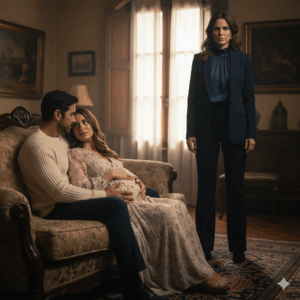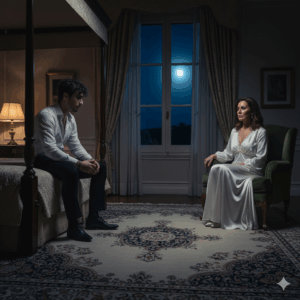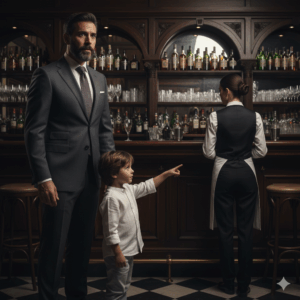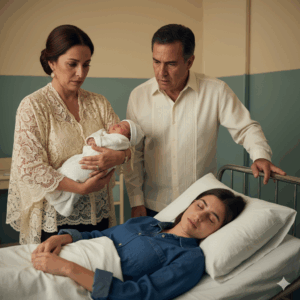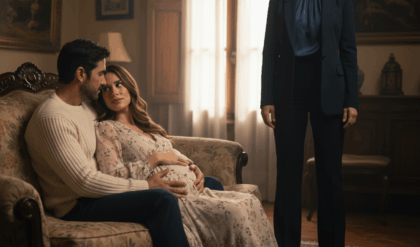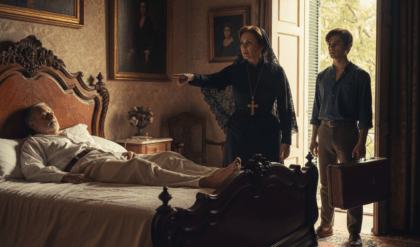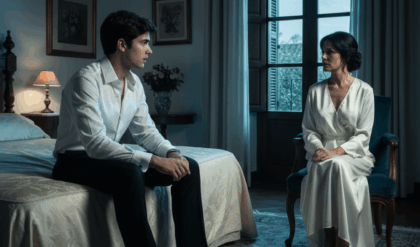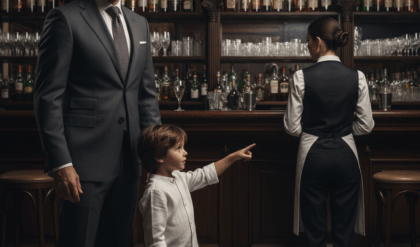My name is Marco. I’m a nurse. Today… I cried silently in the hallway.
No one noticed. No one asked me if I was okay. This morning I sat with two patients as they breathed their last. I hugged a father as he mourned the loss of his son. Later, I washed the hair of a gentleman who looked at me with tired eyes and whispered with a faint smile, “At least I’ll leave this world clean.” His hand clutched mine. No family member came to say goodbye. Every day I give my best. Care. Presence. Human warmth. But in all of this, I often forget to give myself a little kindness. I’m not asking for applause or recognition. Just something simple. Maybe a voice that says, “Hi Marco.” Maybe then, today, I would feel a little less alone.

That afternoon, Marco was still walking silently through the corridors of the hospital, where the cold light of the neon lights fell on the bright floor. His footsteps resounded in rhythm, but his heart was heavy. He had just finished a twelve-hour shift; his hands, rough from washing and disinfecting so much; his eyes, tired of sleepless nights. But the real exhaustion was not in the body, but in the soul: accompanying so many patients until their last breath and saying goodbye to them in silence left a nameless void in him.
Marco arrived at the break room. He sank into the wooden chair, his back hunched over, his hands clasped. No one noticed. Everyone was busy: hurried footsteps, voices calling each other, monitors honking incessantly. He looked at the clock: the hands were advancing, but to him time seemed to stand still. And he wondered: “What is the point of everything? The day I collapse, will there be anyone who will ask me: Marco, are you okay?”
Suddenly, the phone vibrated. A message from Lucia, her shift partner: “Thank you for covering me this morning. So I was able to take my mother to the doctor. I thank you from the bottom of my heart.”
Marco smiled slightly. Just two words – thank you – but they were like a light in the darkness. He understood that, sometimes, it is not the weight of work that crushes us, but the absence of recognition, even if it is minimal.
Then he remembered the words of the old man that morning: “At least I will leave this world clean.” There was peace in his eyes. Marco understood that, for this man, the last moment of dignity was for someone to wash him, caress him, accompany him. And that someone had been him. Perhaps no one else knew, but for that patient, Marco was everything.
That thought made him stand up. He walked to another room. An old woman lay asleep; next to him, the daughter with red eyes. Marco knocked softly on the door.
“Do you need anything?”
She looked at him, surprised:
“Could I bring you a glass of warm water? He always likes to drink a little before bed.”
Marco went for the water. When he returned and saw the woman smiling faintly as she drank, he understood: happiness can be in small gestures, such as offering water to those who are thirsty. And his profession gave him the privilege of creating those moments every day.
That night, as he left the hospital, the cold air hit his face, but inside he felt warmer. He looked at the starry sky and remembered his mother, who died years ago. She used to say to him, “Marco, your value does not depend on the world applauding you, but on the love you give.”
His mother’s voice comforted him. He didn’t need medals or applause. He just had to stay true to his heart, that heart he had chosen to care for.
The next day, Marco wrote a note and stuck it in the break room: “If you see a teammate doing something good today, tell them. We all need to feel seen.”
At first some laughed, but soon more thanks began to be heard. To the cleaners, to the nurses, to the doctors. The atmosphere changed.
And then, Marco also received the unexpected. A young classmate came up and said,
“Marco, yesterday I saw you sitting next to a patient until he left. I learned from you what patience and humanity are. Thank you.”
He was speechless. This time the tears were not of loneliness, but of emotion.
Months passed. Marco continued to work with the same delivery. Witness of farewells, tears and smiles. But he no longer felt invisible. Every “thank you” from a patient, every word of encouragement from a colleague, every time he looked at himself in the mirror and said, “Today you did your best”—all of these were little candles lit in his path.
One day he received a handwritten letter. It was from a patient’s son:
“I couldn’t make it in time to hold my father’s hand, but you did it for me. I will never forget what it meant. Thanks to you, I know that he did not die alone.”
Marco pressed the letter to his chest. He understood that every sleepless night, every tear in the hallway, made sense. Because he had left traces in other people’s lives, although no one knew it more than those families.
That night he wrote in his diary:
“I am Marco. I’m a nurse. I used to cry in solitude. Today I learned that you don’t need the recognition of the world: a grateful heart is enough. I will continue to take care, because I believe that kindness, although small, always leaves light. And I deserve that light too.”
He closed the notebook and smiled. Outside, an ambulance siren sounded. He got up, adjusted his robe, and went back into the hallway. Maybe that night he would cry again, but he knew that his tears were no longer empty: they watered the seeds of love that he sowed every day.
Marco’s story does not end with massive applause, but with the inner peace of knowing that he is valuable. He discovered that his recognition does not depend on diplomas or holders, but on each patient who sighed calmly thanks to his hands, on each colleague who smiled when he heard a thank you, and on the love that he himself learned to give himself.
Marco no longer feels alone. Because now he knows: “When we give love, we become light. And that light never goes out.”
News
Descubrí que mi esposo tenía una conexión y estaba embarazada: quería tomar represalias, pero lo que hice… Lo hizo temblar al final
El hombre al que solía llamar mi esposo, el jefe de mi padre durante cuatro años, el padre de mi hijo, estaba acariciando suavemente a otra mujer fuera de la puerta de la vieja habitación del motel. Su mano…
Antes de que mi padre muriera, pateó a mi madrastra: pensamos que tenía miedo de pelear por la herencia, pero la verdad es aún más impactante…
Antes de morir, mi padre echó a mi madrastra de la casa, pensando que le tenía miedo a la Sra. Tr; lo que fotografió; fortuna con nosotros, inesperadamente la verdad es más Antes de morir, mi padre echó a…
He Married a Woman 19 Years Older Because “She’s Experienced and Deep”—But at 3 A.M., While Heading to the Bathroom, He Discovered Something That Left Him Frozen
He Married a Woman 19 Years Older Because “She’s Experienced and Deep”—But at 3 A.M., While Heading to the Bathroom, He Discovered Something That Left Him Frozen Ravi, 26, was known among his friends as “the wise man with vision”—the…
Se casó con una mujer 19 años mayor porque “tiene experiencia y es profunda”, pero a las 3 a.m., mientras se dirigía al baño, descubrió algo que lo dejó congelado
Se casó con una mujer 19 años mayor porque “tiene experiencia y es profunda”, pero a las 3 a.m., mientras se dirigía al baño, descubrió algo que lo dejó congelado Ravi, de 26 años, era conocido entre sus amigos…
«¡Papá, esa camarera se parece a mamá!» — El millonario se dio la vuelta y se quedó paralizado… ¡Su esposa había muerto!
Papá, esa camarera se parece a mamá. James Sullivan se congeló a mitad de bocado, con el tenedor suspendido entre el plato y la boca. La luz del domingo por la tarde entraba por las ventanas del Bayside Bistro,…
Se descubrió que una mujer que ha estado en coma durante 4 años estaba embarazada: todo el hospital se sorprendió… Pero cuando nació el bebé, el médico jefe renunció silenciosamente porque…
Mujer en coma durante 4 años encontrada embarazada: todo el hospital se estremeció La paciente, R. Sharma, de 27 años, había sido ingresada en un hospital privado en Nagpur, India, en 2021 después de que un grave accidente de tráfico la dejara…
End of content
No more pages to load
